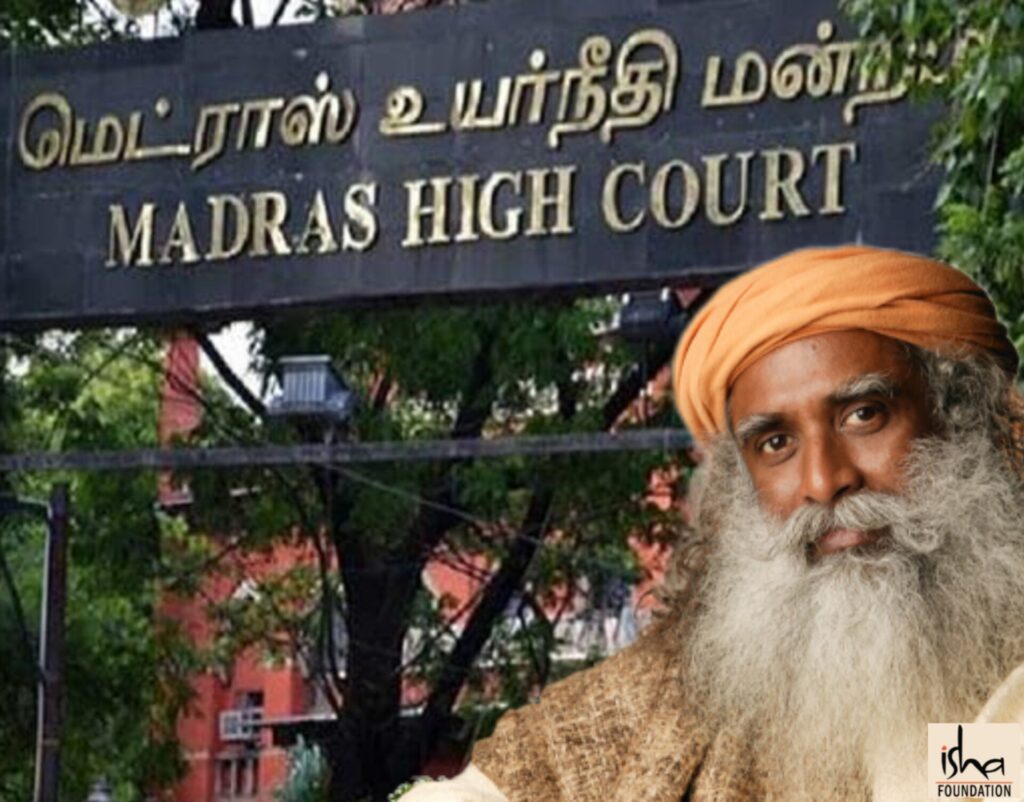Anushri Joshi
The recent intervention by The Madras High Court concerning the Isha Foundation, following a petition by Dr. S. Kamaraj, underscores the delicate balance between individual autonomy and familial rights within spiritual organizations. The court has ordered a detailed inquiry into the foundation, particularly in light of allegations asserting that Dr. Kamaraj’s two daughters, Geetha Kamaraj and Latha Kamaraj, were being held against their will and subjected to psychological manipulation. Dr. Kamaraj claimed that his daughters were being coerced into renouncing worldly life and living as hermits, raising serious concerns regarding their personal freedom.
In a significant development, approximately 150 police officers were deployed to search the Isha Foundation premises following the Madras High Court’s directive. This enforcement action aims to ascertain the veracity of the allegations made against the foundation and to ensure the well-being of the sisters in question.
In the habeas corpus petition, Dr. Kamaraj contended that his daughters were not only being confined at the foundation’s ashram in Coimbatore but were also being influenced to sever ties with their family. This assertion raises critical questions regarding the rights of adults to make autonomous decisions about their spiritual journeys juxtaposed with the rights of families to intervene when they perceive potential harm. The constitutional guarantee of personal liberty under Article 21 of the Constitution of India stipulates that no individual shall be deprived of their life or personal liberty except according to the procedure established by law.
The High Court’s inquiry is particularly significant as it aligns with the judiciary’s responsibility to safeguard individual rights while ensuring institutional accountability. During the proceedings, Justice S.M. Subramaniam and Justice V. Sivagnanam expressed their concerns regarding the allegations of coercion and manipulation, drawing attention to the apparent contradictions in the life of Sadhguru Jaggi Vasudev, founder of the Isha Foundation. The court questioned why Sadhguru, who has a daughter of his own who is married and well-settled, would encourage other young women to adopt monastic lifestyles, such as shaving their heads and renouncing worldly pursuits. This inquiry aligns with the legal principle that protects individuals from undue influence, similar to precedents such as Shafin Jahan vs. Asokan K.M, 2018[1] The Madras High Court’s examination of the circumstances surrounding the Kamaraj sisters’ association with the Isha Foundation represents a critical juncture in the ongoing discourse surrounding individual freedoms and familial rights. As the court navigates this complex landscape, its approach will be pivotal in ensuring justice while respecting the delicate interplay between personal liberties and familial obligations. The inquiry underscores the importance of transparency and accountability within spiritual organizations, which must operate within the framework of the law and uphold the rights of individuals in their pursuit of spiritual fulfillment., as the Supreme Court upheld the sanctity of personal choice.
Despite the claims of the two women that their residency at the Isha Foundation was voluntary, the court’s apprehensions necessitated a thorough examination of the foundation’s practices. The court highlighted the potential implications of spiritual organizations that may exploit vulnerable individuals for their agendas, reflecting concerns articulated in the case State of Karnataka v. Appa Balu Ingale ,1995[2], which emphasized the judiciary’s role in protecting individual rights from social or institutional coercion. This sentiment was echoed when the petition detailed that the foundation allegedly administered food and medicines that dulled the cognitive faculties of the sisters, leading them to sever all ties with their family.I n response to the allegations, the Isha Foundation asserted that it does not compel individuals to adhere to any particular lifestyle, emphasizing the autonomy of its residents. In a statement, the foundation described the police action as a “general inquiry” and indicated that they were cooperating with law enforcement to clarify the circumstances surrounding the Kamaraj sisters’ association with the foundation. It maintained that it does not ask people to get married or to become monks, emphasizing that these are individual choices. The foundation’s counsel argued that adults have the right to make their own decisions about their lives, including the choice to embrace a spiritual path.
The court also expressed concern about the apparent hostility between the sisters and their parents.The Bench remarked that if the daughters were indeed on a path of spirituality, neglecting their parents could be construed as a moral failing, stating, “You claim to be on the path of spirituality. Don’t you think that neglecting your parents is a sin?” This perspective reinforces the notion that spiritual pursuits should not come at the cost of familial relationships.
Furthermore, the court has directed law enforcement to provide a status report detailing any pending criminal cases against the Isha Foundation. Notably, this inquiry encompasses allegations involving a doctor associated with the foundation under the Protection of Children from Sexual Offences (POCSO) Act, who has been accused of molesting schoolgirls. This aspect of the inquiry emphasizes the judiciary’s commitment to addressing potential misconduct within organizations, reinforcing the legal obligation of all institutions to adhere to established norms and regulations.
The Madras High Court’s examination of the circumstances surrounding the Kamaraj sisters’ association with the Isha Foundation represents a critical juncture in the ongoing discourse surrounding individual freedoms and familial rights. As the court navigates this complex landscape, its approach will be pivotal in ensuring justice while respecting the delicate interplay between personal liberties and familial obligations. The inquiry underscores the importance of transparency and accountability within spiritual organizations, which must operate within the framework of the law and uphold the rights of individuals in their pursuit of spiritual fulfilment.
Case Name: Dr. S. Kamaraj vs. State of Tamil Nadu,
Case Number : HCP.No.2487 of 2024
Bench: Justice S.M. Subramaniam and Justice V. Sivagnanam
[1] 16 SCC 368
[2]4 SCC 469
Click here to access the order

